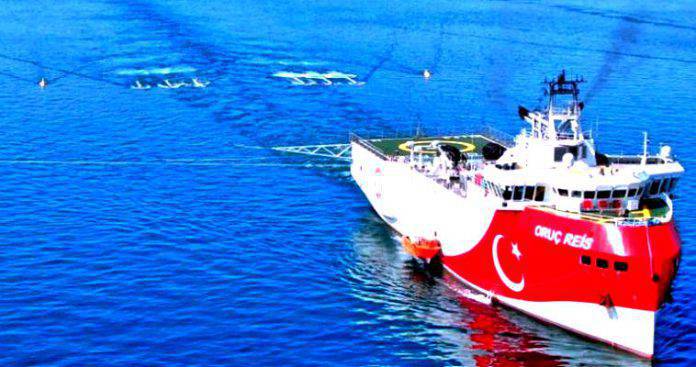Alexandros Tarkas: The six signs that the departure of Oruc Reis was imminent
14/10/2020
The government is surprised by the new departure from port of the research vessel Oruc Reis with Prime Minister Kyriakos Mitsotakis was the most prominent of those “deceived” or voluntarily turning a blind eye, who, in an unprecedented way in times of crisis, rushed to a precautionary separation of responsibilities. He said that, regarding the resumption of exploratory contacts, “this was at least the assurance I had from Foreign Minister Nikos Dendias”.
However, no one in the triangle of the PM’s office – Diplomatic Service – GEETHA triangle, led by the traditionally diligent Kyriakos Mitsotakis, has the right to feel surprised by the development in Greek-Turkish relations. Because all the data of the last quarter showed and shows, a continuation of the escalation with long duration and great intensity.
The first negative milestone was recorded at the secret meeting on July 13 in Berlin, between diplomatic advisers Eleni Sourani and Ibrahim Kalin under their German counterpart Jan Hecker. The Turkish side stated directly that it demanded the examination of a number of issues in the exploratory contacts, instead of the Greek agenda for the continental shelf-EEZ.
Independently of whether there was a “written agreement”, according to the prime minister’s writings, or a “written understanding” as corrected by Minister of State George Gerapetritis, or “registration of minutes” as later claimed, is a clear statement of Turkish intentions. which Ankara never annulled.
The second message, in provocative phraseology and in a not at all diplomatic way, was sent at the end of July, when the first exit of Oruc Reis had not yet taken place. The Greek-Egyptian agreement on the partial demarcation of the EEZ had not been signed and the start of exploratory contacts was expected on 28 August. The foreign ministry of the neighboring country stressed to the Greek embassy in Ankara that, during the exploratory contacts, Turkey would continue research activities in areas that it considers under its own jurisdiction, with simultaneous military activities. Not even this Turkish message, which is said to have been almost in ironic tones, has since been overturned.
Pressures on Mitsotakis
The third clear indication of escalation is shown from the behind-the-scenes contacts between Germany, Greece, and Cyprus in mid-September, before the European Council on the sanctions mechanism. Authoritative sources confirm that Chancellor Angela Merkel asked Kyriakos Mitsotakis and Cypriot President Nikos Anastasiadis for tolerance for just a few weeks for contacts with Tayyip Erdogan, who, however, did not make any commitment to change the targets after the end of this period.
It is also a common secret in Brussels that the – also a mediator – President of the European Council Charles Michel almost collapsed psychologically, after a communication with the threatening Tayyip Erdogan. The situation was not corrected by Ankara and Berlin.
The fourth warning was issued to the government by the US Secretary of State during the Suda talks on September 29. Mike Pompeo expressed frustration with Turkey’s move away from the West. He honestly clarified to Kyriakos Mitsotakis that there was no certainty as to the effectiveness of the interventions to Ankara to show good faith, before the investigative talks and during them.
German vigilance
The fifth clear sample of Turkish threatening intentions followed the bilateral “technical arrangements” agreement in NATO in the first week of October. While the climate between the two allies needed to be improved and sufficient time elapsed for the implementation and evaluation of the agreement, Ankara demanded the immediate resumption of talks under the auspices of the NATO Military Committee. It also demanded the rapid implementation of additional rules for the operational activity of the two fleets in the Mediterranean.
The sixth omen, about the shock or collapse of the investigative framework, was broadcast a few days ago by German diplomacy. Foreign Minister Haiko Maas had scheduled an urgent tour, as Tayyip Erdogan had demanded specific Greek initiatives for the East Aegean islands, apparently the start of so-called demilitarization, as a condition for launching exploratory talks…
Despite the serious deterioration of the situation, the PM’s office still has opportunities for the peaceful promotion of national interests and time for interventions. It is urgent, however, to seek intra-governmental, intra-party, and cross-party consensus, without delaying until the time of a crisis. Theoretically, an ideal solution would be to convene a Council of Party Leaders, but there is no one to reliably argue that the current occupant of the presidential palace has a special weight to contribute to the adjustment of the country’s diplomatic and defense tactics, or to achieve a common line of policies. leaders.





